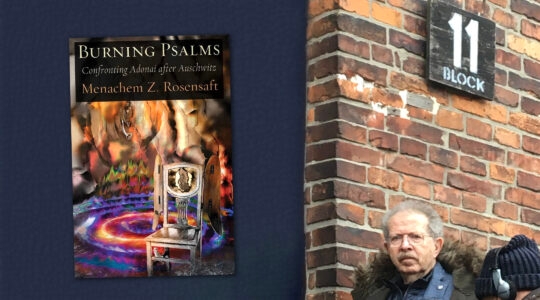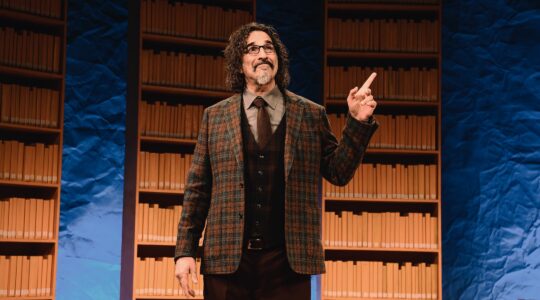Near the end of “Jojo Rabbit,” the new Holocaust “comedy” film, a Hitler Youth recruit whose imaginary best friend is none other than a buffoonish Adolf Hitler, literally kicks the Fuhrer and his brand of racist hatred out of his home. The tween, who had swallowed the Nazis’ preaching about pernicious Jews, goes further, protecting a teenage Jewish girl who has found refuge in his family’s attic.
And speaking of attics: On the recent Netflix series “Historical Roasts,” the night’s guest of honor, Anne Frank, and other wartime leaders take merciless jabs at Hitler. Emcee Jeff Ross dons a yellow Star of David armband, as does Anne (played by Rachel Feinstein), who states that life in the attic “sucked.”
In a new novel, “The Ventriloquists,” by E.R. Ramzipoor, a group of Resistance fighters in Nazi-occupied Belgium outwit local Nazi leaders by putting out a fake edition of the country’s most prominent newspaper. The publication, which attacks Hitler and undermines the occupation, is a best-seller, and the Nazis, it turns out, are just a bunch of ill-intentioned but ultimately incompetent stooges.
At a time when real-life neo-Nazis marched not long ago in Charlottesville, when Jews have been killed at worship by real-life white supremacists and when, just this week, flesh-and-blood far right politicians surged in elections in eastern Germany, satire would seem a dull weapon to wield.
But a wide range of artists, including the Jewish director of “Jojo Rabbit,” insists that even in these dark times, black comedy is precisely the knife that can cut deep against rising hate and intolerance. The people behind these new examples of post-Mel Brooks “Springtime for Hitler and Germany” Holocaust humor assert that hatred is no laughing matter. But they add that they are serving a higher motive, of raising the public’s consciousness about intolerance, mass psychology and mob rule.
Taika Waititi, the Polynesian Jewish director of “JoJo Rabbit,” which has scored well at the box office for an indie film and is generating Oscar buzz, has called his effort “an anti-hate satire,” a metaphor for the current climate of political hatred and extremism.
And the Netflix comedy roast of Anne Frank, says veteran comedian Ross, is a loving but irreverent strike at Nazi sympathizers and a remedial education tool for young people who barely know who Nazis are.
“I only kid the ones I love,” Ross said when the roast premiered, adding that many young people he has met confuse Anne Frank with Helen Keller. Waititi said he was disturbed by statistics that 41 percent of people in the U.S., and 66 percent of millennials, had never heard of Auschwitz.
Ramzipoor told an interviewer that her caper of a novel (the rogue journalists have only 18 days to produce the satiric newspaper) “is a book about underdogs, about the people whom the Nazis tried to strip of their dignity: queer people, Jewish people, disabled people, women, children. In this book, these heroes get to be the masters of their own story.”
Are these works safe humor, amusing the viewer/reader when they should be challenging them? “It can be comforting to laugh at Hitler,” Daniel Gross wrote in The Atlantic. “Laughter helps audiences feel that they’ve overcome evil.”
It’s part of what’s behind “Jojo Rabbit,” whose protagonist literally gives the (jack)boot to Hitler. The film is about a dedicated-but-naïve 10-year-old member of the Hitler Jugend (Hitler Youth) organization in a small German town near the end of WWII. Socially inept Johannes Betzler imagines his best friend — his muse and personal Greek chorus — to be Hitler, played by Waititi, a filmmaker and comedian from New Zealand who wrote the screenplay and directed the film.
Its title came from the nickname Betzler received when he refused to kill a rabbit in a Hitler Jugend training exercise. It turns out that Jojo’s mother (played by Scarlett Johansson, who shows unexpected comedy chops), a clandestine member of the Resistance movement, is sheltering a 16-year-old Jewish girl whose parents were deported to a concentration camp. Jojo eventually develops a crush on her.
The film, the latest of more than a dozen cinematic “Holocaust comedies” in the last 20 years, features several serial-“Heil”ing Nazi functionaries, and Waititi’s posturing, goofy Fuhrer.
Waititi called his depiction of Hitler intentionally unrealistic. “He’s not really Hitler. He’s like a 10-year-old kid’s version of Hitler.”
“Jojo Rabbit,” Richard Brody wrote in The New Yorker last week, is “the movie that Bialystok and Bloom, in [Brooks’] ‘The Producers,’ would have made when they got out of prison and went legit.”
The Anne Frank episode of “Historical Roasts” is the creation of New Jersey-born Ross, the self-declared “Roastmaster General” who has starred in a series of X-rated roasts of celebrities like Justin Bieber, Alec Baldwin — and, a few years ago, Donald Trump. He’s also done recent “Historical Roasts” of such past figures as Cleopatra, Muhammad Ali and Abraham Lincoln.
This year, Ross turned to Anne Frank, the symbol of all Shoah victims.
Are he, and the other Jewish performers who took part in the roast, exempt from criticism because of their religious-ethnic identity?
As the event’s emcee, wearing his Star of David armband, Ross introduces the people on the dais – notably Hitler, played by comedian Gilbert Gottfried, who banters about ovens and a “final solution” to climate change.
Jon Lovitz plays Franklin Roosevelt. At the end, Anne Frank, played by comedienne Rachel Feinstein, gets the last lines if not the last laughs. Life in the attic, she says, “sucked.”
Gottfried’s casting as Hitler was a symbolic victory, Feinstein’s Anne Frank tells the audience, noting the incongruity of the 20th century’s worst anti-Semite played by “the loudest, most annoying Jew we could possibly find.”
In “The Ventriloquists,” Ramzipoor’s debut novel, which is based on a true wartime event, the satirical newspaper conspirators boost the morale of their fellow Belgians while risking their own lives.
The premise of the three works is that Hitler — and, by extension, the wider Nazi Party — is a figure to be laughed at, lampooned, held up to a lens of satire. (Remember Colonel Klink in “Hogan’s Heroes”?)
“What better way to insult Hitler,” Waititi wrote on Twitter, “than having him portrayed by a Polynesian Jew?” Waititi’s father is Maori; his mother is from a Russian Jewish family. “I experienced a certain level of prejudice growing up as a Maori Jew,” he has said.
The “Historical Roast” stepped up to, then leaped over, the boundary of good taste. Gottfried’s Hitler, who got “a day pass” from Hell to appear at the roast, tells Anne Frank, “of all the accounts that I’ve read … your book is by far the most flammable.”
Though Ross’ intentions were pure, a “roast” of a Holocaust icon was sure to offend, much in the way that Art Spiegelman’s Pulitzer Prize-winning graphic novel “Maus,” about his Holocaust survivor parents, drew controversy not because it disrespected the topic of the Shoah but because an adult comic book was not considered a proper venue for a Holocaust story.
Ross found that his Jewish identity did not protect the roast from criticism. Dozens of viewers cancelled their Netflix subscriptions. “Tasteless satire,” said the Anne Frank House in Amsterdam. “Unwelcome,” said an anti-Semitism watchdog organization in Holland.
“I knew there’d be some backlash” — really? — “and it does hurt,” Ross said in a podcast.
In the roast, he tried to fend off criticism by making social commentary. “If you’re offended by anything you see tonight,” he said, “just do what FDR did and look the other way.”
Staff writer Steve Lipman is the author of “Laughter in Hell: The Use of Humor during the Holocaust” (Jason Aronson, 1991), a study of the role humor played among victims of the Third Reich.
The New York Jewish Week brings you the stories behind the headlines, keeping you connected to Jewish life in New York. Help sustain the reporting you trust by donating today.




